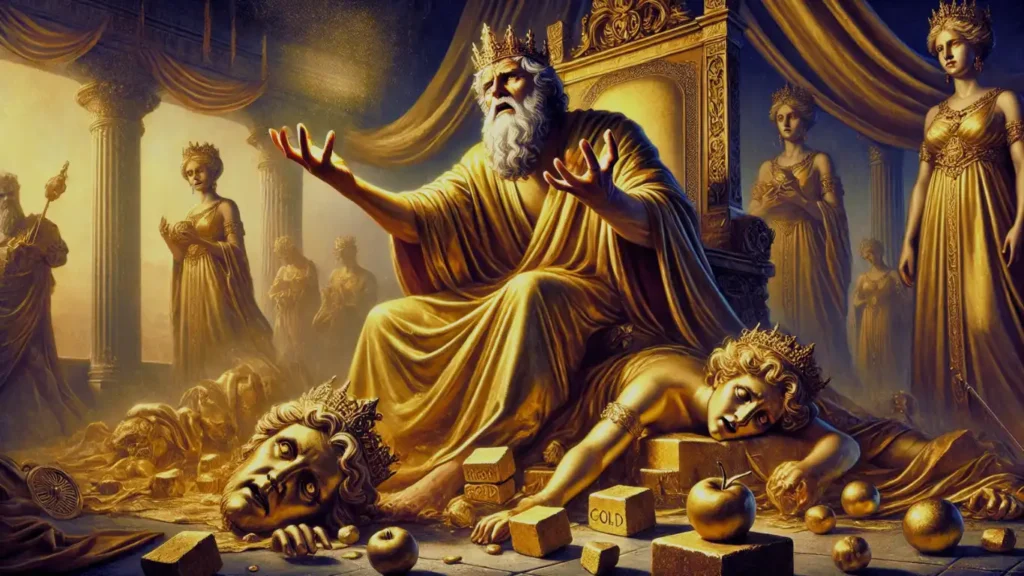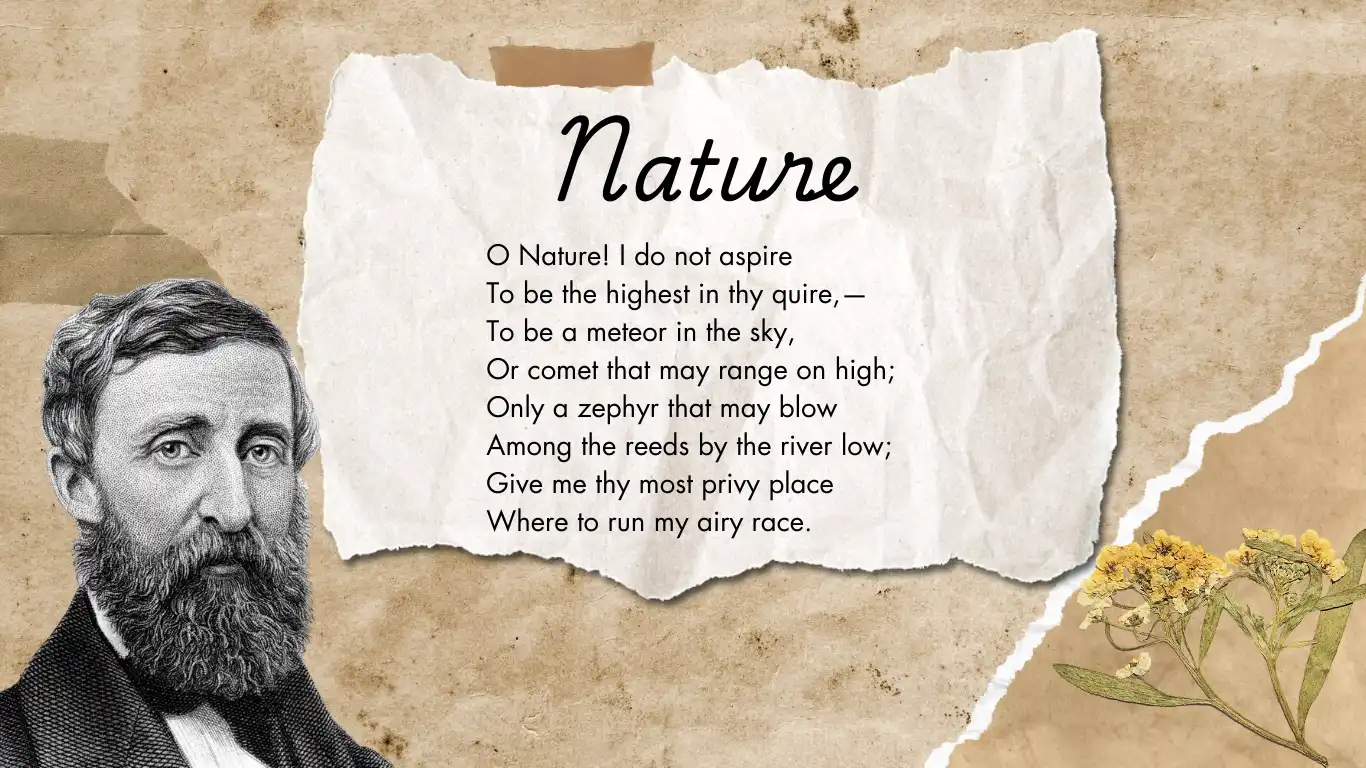Who Was Henry David Thoreau?
Henry David Thoreau (1817–1862) was an American writer, philosopher, naturalist, and transcendentalist, best known for his works on individualism, civil disobedience, and his reflections on nature and simple living. He was a key figure in the transcendentalist movement, which emphasized the inherent goodness of people and nature, the importance of individual conscience, and the rejection of materialism.
Thoreau is most famous for his book Walden; or, Life in the Woods (1854), a reflection on simple living in natural surroundings. It was inspired by his two-year experiment living in a small cabin he built near Walden Pond in Concord. It explores themes of self-reliance, individualism, spiritual awakening, and the critique of materialism.
Thoreau was a pioneer in ecological thought and was deeply interested in environmental conservation. HIs poems and reflections on the sublimity and simplicity of nature invite contemplative meditations on the close interconnectedness between humanity, nature, and life. Let’s explore one of the poems from his collection.
Poem On Nature By Henry David Thoreau
NATURE
O Nature! I do not aspire
To be the highest in thy quire,—
To be a meteor in the sky,
Or comet that may range on high;
Only a zephyr that may blow
Among the reeds by the river low;
Give me thy most privy place
Where to run my airy race.
In some withdrawn, unpublic mead
Let me sigh upon a reed,
Or in the woods, with leafy din,
Whisper the still evening in:
Some still work give me to do,—
Only—be it near to you!
For I’d rather be thy child
And pupil, in the forest wild,
Than be the king of men elsewhere,
And most sovereign slave of care:
To have one moment of thy dawn,
Than share the city’s year forlorn.
Reflections On The Poem:
The poem invites a deep reflection on the interconnectedness between humanity and nature. It is saying that let me be closer to nature than be caught in human life. There is a connection with nature and experience of simplicity and silence which is greater than city life.
I do not aspire to be the highest in your quire.
He is saying to Nature that – ‘I do not wish to be the best in you. I have no desire to dominate others, nor do I want to tower over everyone else. I do not wish to conquer others with my ego, nor do I wish to rule anyone. I do not aspire for these things.’
To be a meteor in the sky or comet that may range on high
‘Nor do I want to be like the comet or the meteor which is soaring high up above in the world. I do not want to be like these things…’
Only a zephyr that may blow
Among the reeds by the river low;
‘O dear beloved nature, what I want is to be like the wind – the zephyr which blows among the reeds and goes by the river.’
These lines are a reflection on human ego and desire for fame and glory which often comes at the cost of abandoning the sublime beauty and simplicity of life and existence. Here, the poet is expressing a wish to connect with the more simple and silent forces of nature – to become one with those movements that are as simple as the blowing of the wind.
Give me thy most privy place
Where to run my airy race.
He is asking nature to give him a private place – a realm of silence for contemplation and reflection where he may connect with nature on a deeper level.
In some withdrawn, unpublic mead
Let me sigh upon a reed,
Or in the woods, with leafy din,
Whisper the still evening in
Some still work give me to do,—
Only—be it near to you!:
Here, once again, the poet requests Nature to give him some silent space which is far away from the public noise and gatherings. He desires for meadow, for a cool and quiet place in the woods where he may sit in silence, make music, and meditate – where he may be engaged in whatever tasks nature sets him up to.
Why is he asking for these things from nature?
He’s making the requests so that he can be utterly connected to nature and not grow distant from it. Thus, he makes the lines – Only – be it near to you!
The poet expresses the deeper desire to be close to nature so that he may become one with it. He is asking nature to keep him engaged and give him a space which is far away from the noise and pollution of the city crowd. He wishes to stay away from the madness so that in the calm and cool quietness of a green meadow he may unite on a deeper level with nature.
For I’d rather be thy child
And pupil, in the forest wild,
He is saying that he’d rather choose to become like a child and learn from nature – be the pupil, the student who observes the proceedings in nature and even acquires wisdom from the wilderness.
Than be the king of men elsewhere,
And most sovereign slave of care
He’d rather be close to nature and become a pupil than be the King of men somewhere far away from nature. He doesn’t want to be burdened and become a slave of care and desires. He’d rather be a pupil…
To have one moment of thy dawn,
Than share the city’s year forlorn.
He’d rather enjoy the sublime wealth of even a single moment of nature’s peace than spend an entire year in a city where he gets nothing but despair and sorrow.
Man vs Nature
The poem is a deep and beautiful reflection on the conflict between nature and human life.
The human society with its sprawling building, gas pumping vehicles, loud engines, polluted water, toxic air, violent politics, and criminal organizations create panic, anxiety, disorder, chaos, mental delirium, unchecked ambition, hatred, greed, and various other mental diseases in the body which bring nothing but woe. And these sorrows despite all economic development keep on mounting like the pain of King Midas, who was blessed and cursed at the same time with the gift of gold.
Story Of King Midas

King Midas acquired the magical power of converting everything into Gold. So, whatever he touched turned into the precious metal. This delighted him in the beginning, when he touched a stone and marveled as the rock converted into gold, but later this very gift turned into a curse. When King Midas grew hungry and wished to eat an apple, it also turned to gold and cracked his teeth. Full of anger and sorrow, King Midas cried out loud, upon which his wife came to solace and embrace him, but when King Midas touched her, even she turned to Gold, after which King Midas’ daughter, son, and everyone else became gold and lifeless.
The story of Midas is a grim reminder of unchecked growth, greed, and materialism which takes away everything precious from us while returning us nothing but heavy weight. The story resonates with the theme of the poem as they both reflect upon ideas of unchecked growth in the city that comes at the cost of connection with deeper human emotions and nature.
Thoreau’s poem expresses an inherent human desire to be closer to nature and enjoy its sublime beauty. It reminds us of the peace, silence, and joy that comes upon connecting with nature and spending some time with it. It is also a critique of modern human society that continues its delirium of development but only at the cost of environmental degradation. It is a gentle reminder for us to reconnect with nature and discover the innate sublime realm that waits for us and is always ready to fill us with peace, silence, and divinity.






